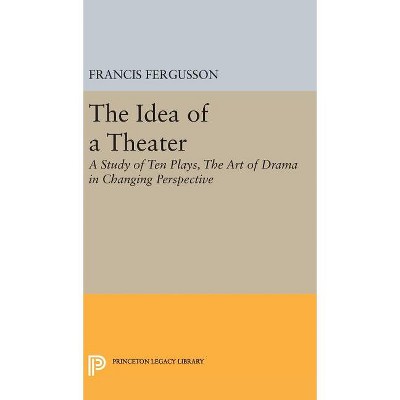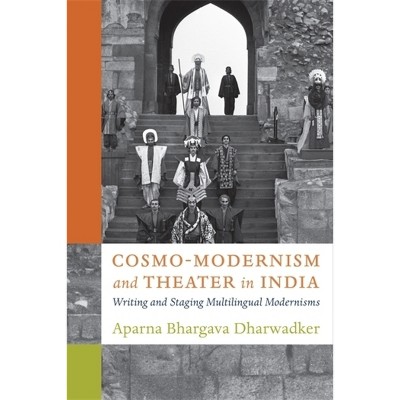Sponsored

Theater After Film - by Martin Harries (Hardcover)
$115.00
In Stock
Eligible for registries and wish lists
Sponsored
About this item
Highlights
- A study of the impact of film and mass culture on drama after World War II.
- About the Author: Martin Harries is professor of comparative literature at the University of California, Irvine.
- 304 Pages
- Literary Criticism, Drama
Description
About the Book
"Theater after Film concerns the impact of film and mass culture on forms of drama after World War II. Martin Harries argues that after 1945, as cinema became omnipresent in the culture, theater couldn't challenge cinema's hegemony, but it could provide a zone of contestation. Theater could, in other words, make film's rule of the cultural field visible through hyperbole, refusal, and other strategies, thereby unsettling cinema's power. Postwar theatrical experiment, Harries shows, often channeled and represented the mass cultural force film, knowing it could never possess it. Although it treats the theatrical work of many figures, the book's greatest focus is on Tennessee Williams, Samuel Beckett, and Adrienne Kennedy. This trio signals Harries's interest in bringing critical performance theory into contact with the history of drama: while these are canonical playwrights, they are also immersed in the discourses of race, gender, and sexuality that have formed that canon. These discourses are also central to the book's historical engagement with the media surround that drama confronted. This confrontation, Harries shows, was central to the development of some of the most continually compelling postwar drama"--Book Synopsis
A study of the impact of film and mass culture on drama after World War II. In Theater after Film, Martin Harries argues that after 1945, as cinema became omnipresent in popular culture, theater had to respond to cinema's hegemony. Theater couldn't break that hegemony, but it could provide a zone of contestation. Theater made film's domination of the cultural field visible through hyperbole, refusal, and other strategies, thereby unsettling its power. Postwar theatrical experiment, Harries shows, often channeled and represented film's mass cultural force, while knowing that it could never possess that force. Throughout the book, Harries brings critical theory into contact with theories of performance. Although Theater after Film treats the theatrical work of many figures, its central focus falls on Tennessee Williams, Samuel Beckett, and Adrienne Kennedy. Discussions of these dramatists consider their ways of addressing spectators, the politics of race between film and theater, and the place of the theatrical apparatus. Readings of these central figures in twentieth-century theater exemplify the book's historical engagement with the media surround that drama confronted. This confrontation, Harries shows, was central to the development of some of the most continually compelling postwar drama.Review Quotes
"[This book] is about how several post-WWII playwrights reacted to the emerging dominance of cinema, using their plays to confront film's media mastery and resist the threat of globalist mass culture. The argument is as much informed by theorists--Adorno, Brecht, Benjamin, Artaud, Barthes, etc.--as by the works of the playwrights Harries uses as exemplars: 60 percent of the book is devoted to discussions of the plays of Tennessee Williams, Samuel Beckett, and Adrienne Kennedy." -- "Library Journal"
"Theater after Film is that rare thing: a book that achieves a decisive theoretical intervention by means of the most scrupulous critical attention to its chosen historical and aesthetic materials. Harries's writing is elegant and precise, wrought with extraordinary care from extensive study and deep thought. His work offers readers a richly historicized understanding of theatrical responses to the media culture inaugurated by film."-- "Nicholas Ridout, Queen Mary University of London"
"An intellectually thrilling account of postwar theater's aesthetic enmeshment in--and contestation of--mass media. Harries's writing is unparalleled in its combination of rigorous historicism, searching theoretical inquiry, and brilliant close reading. In a series of illuminating essays, Harries shows how the very particularities that have consigned theater artists to distinct canons actually form a 'dialectical sequence' of profound investigations into modern spectatorship. Anyone who cares about what stage plays can be in a society dominated by other media ought to read Theater after Film."-- "Julia Jarcho, Brown University"
"There is nothing in studies of postwar theater to match the theoretical elegance of this book and the lucidity of its critical address. Harries's readings, like his reflections on his methodology, are as scrupulous as they are generous. Each essay offers both intricate analyses of particular works and revelatory conclusions about theater's potential as a site of aesthetic and ideological contestation. This book is transformative. You read it, and the sky lights up."-- "Shonni Enelow, Fordham University"
About the Author
Martin Harries is professor of comparative literature at the University of California, Irvine. He is the author of Forgetting Lot's Wife: On Destructive Spectatorship and Scare Quotes from Shakespeare: Marx, Keynes, and the Language of Reenchantment.Dimensions (Overall): 9.0 Inches (H) x 6.0 Inches (W) x .81 Inches (D)
Weight: 1.28 Pounds
Suggested Age: 22 Years and Up
Number of Pages: 304
Genre: Literary Criticism
Sub-Genre: Drama
Publisher: University of Chicago Press
Format: Hardcover
Author: Martin Harries
Language: English
Street Date: May 23, 2025
TCIN: 1006102001
UPC: 9780226838700
Item Number (DPCI): 247-50-3039
Origin: Made in the USA or Imported
If the item details aren’t accurate or complete, we want to know about it.
Shipping details
Estimated ship dimensions: 0.81 inches length x 6 inches width x 9 inches height
Estimated ship weight: 1.28 pounds
We regret that this item cannot be shipped to PO Boxes.
This item cannot be shipped to the following locations: American Samoa (see also separate entry under AS), Guam (see also separate entry under GU), Northern Mariana Islands, Puerto Rico (see also separate entry under PR), United States Minor Outlying Islands, Virgin Islands, U.S., APO/FPO
Return details
This item can be returned to any Target store or Target.com.
This item must be returned within 90 days of the date it was purchased in store, shipped, delivered by a Shipt shopper, or made ready for pickup.
See the return policy for complete information.
Trending Poetry

Bestseller
$22.89
was $24.48 New lower price
Buy 2, get 1 free select books
4.6 out of 5 stars with 52 ratings




$9.85 - $23.09
MSRP $15.99 - $32.99
Buy 2, get 1 free select books
4.8 out of 5 stars with 147 ratings

$20.58
MSRP $30.00
Buy 2, get 1 free select books
5 out of 5 stars with 6 ratings
Discover more options

$18.99 - $20.99
MSRP $20.00 - $29.99
Buy 2, get 1 free select books
5 out of 5 stars with 1 ratings




